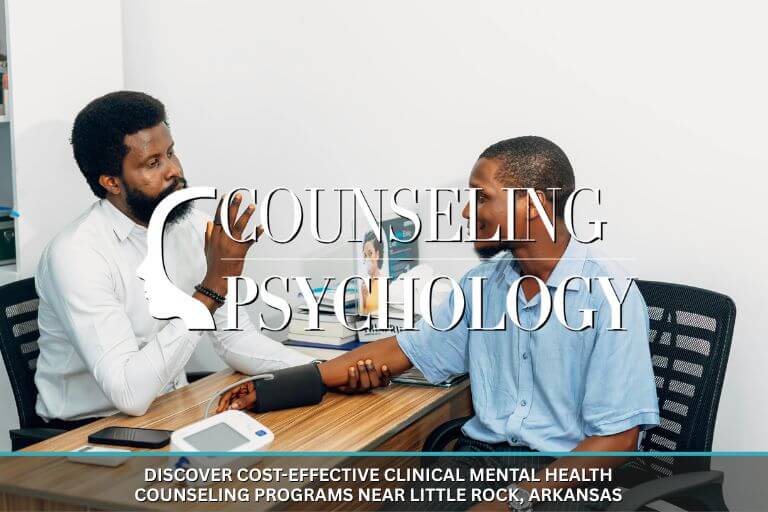Discover Cost-Effective Clinical Mental Health Counseling Certificates Near Little Rock, Arkansas

Little Rock, Arkansas, serves as both the state capital and a regional hub for healthcare and social services. Despite its growing behavioral health infrastructure, anchored by the UAMS Psychiatric Research Institute and Arkansas Children's Hospital, the state employs only 1.5 mental health counselors per 1,000 jobs, falling short of the national average of 2.9. To help licensed professionals expand their clinical skill set without committing to a complete master's degree, graduate certificates in clinical mental health counseling provide a targeted, cost-effective pathway. Albuquerque programs leverage in-state tuition benefits, cohort discounts, and scholarship opportunities at UA Little Rock and Pulaski Technical College, and you can explore all accredited options through Counseling Schools in Arkansas.
2026 Cost-Effective Clinical Mental Health Counseling Programs Near Little Rock, Arkansas
University of Arkansas at Little Rock
Little Rock, AR - Public 4-Year - ualr.edu
Master's - Clinical Mental Health Counseling
Online Learning - Visit Website
The University of Arkansas at Little Rock's online Master of Arts in Counseling represents an affordable pathway for aspiring mental health professionals. With a competitive 60-credit curriculum focused on clinical mental health counseling, the program offers significant cost advantages through its flexible online format, reducing transportation and housing expenses. The program's comprehensive training encompasses ethical practice, human rights, and professional development, with integrated practicum and internship experiences. Military-friendly status potentially offers additional financial benefits for veterans. Graduates are strategically prepared for licensure, enabling quick workforce entry and potential rapid return on educational investment. The program's emphasis on practical skills and community impact makes it an economically sensible choice for students seeking comprehensive mental health counseling education.
- 60 credit hours
- Online program
- Prepares for licensure
- Includes practicum, internship
- Focus on ethical practice
University of Central Arkansas
Conway, AR - Public 4-Year - uca.edu
Master's - Mental Health Counseling (M.S.)
Campus Based - Visit Website
The University of Central Arkansas provides an affordable Master's in Mental Health Counseling that stands out for its comprehensive 60-semester hour curriculum. Located near Little Rock, this program offers exceptional value with its robust training preparing students for professional licensure. The campus-based program requires GRE scores but minimizes additional financial barriers through strategic tuition pricing. Students benefit from a semester-long internship and focused training in counseling theories, making it cost-effective for aspiring mental health professionals. The February 1 application deadline and emphasis on ethical standards ensure a structured, high-quality educational experience. Graduates are well-positioned for roles in private practice and community mental health centers, with a curriculum designed to meet Arkansas licensure requirements.
- 60 semester hours
- Campus-based program
- Includes internship
- Meets Arkansas licensure requirements
- GRE scores required
- February 1 application deadline
- Personal statement needed
- Focus on counseling theories
- Ethical standards training
- Prepares for private practice
Harding University
Searcy, AR - Private 4-year - harding.edu
Master's - M.S. in Clinical Mental Health Counseling
Campus Based - Visit Website
Harding University offers a comprehensive 60-credit hour M.S. in Clinical Mental Health Counseling that provides an affordable pathway to professional counseling through its hybrid program. Uniquely CACREP-accredited, the curriculum balances theoretical foundations with extensive practical training, preparing students for Licensed Professional Counselor certification in Arkansas. The program's Christian values and technology-assisted counseling electives distinguish its approach, while practical experiences through practicum and internship opportunities ensure graduates develop real-world skills. Cost-effectiveness is enhanced by its flexible format and strong emphasis on career readiness. No specific entrance exam is prominently mentioned, potentially reducing financial barriers to entry. The program's multifaceted approach equips students to address diverse mental health challenges across various professional settings.
- CACREP-accredited program
- 60 credit hours
- Hybrid format
- Prepares for LPC licensure
- Christian values emphasized
- Practical experience included
- Admission interview required
- MMR immunization needed
- Three recommendation letters
- Online application process
Regional Landscape & Practicum Partnerships
Developing hands-on counseling skills requires immersive, supervised experiences across diverse community settings. Little Rock's certificate programs partner with public, private, and nonprofit agencies to ensure students engage with real-world client populations from day one. These field placements not only satisfy licensure prerequisites but also enable interns to integrate theoretical knowledge into practice, refine intervention strategies, and cultivate cultural competence.
- Arkansas Behavioral Health Alliance places students in outpatient clinics specializing in mood disorders, trauma, and addiction, where they co-facilitate therapy groups and conduct intake assessments under licensed supervisors.
- The Little Rock School District embeds certificate candidates in K–12 environments, assisting with crisis intervention, social-emotional learning initiatives, and collaboration with school counselors on family engagement efforts.
- UAMS Psychiatric Research Institute offers placements in integrated-care clinics, providing exposure to team-based treatment planning for individuals with severe mental illnesses.
- StoneBrook Behavioral Health offers internships that focus on adolescent and family counseling, emphasizing evidence-based approaches such as cognitive-behavioral therapy and dialectical behavior therapy.
Program advisors at UA Little Rock coordinate these partnerships, guaranteeing that students complete the 100–120 supervised hours required for Arkansas's provisional counseling licensure.
Program Spotlights
Comparing exemplar certificates highlights how Little Rock institutions balance affordability, accreditation, and specialized focus areas:
UA Little Rock – Graduate Certificate in Clinical Mental Health Counseling
UA Little Rock's certificate requires 12 credits, with in-state tuition at $300 per credit hour. The hybrid format combines weekend intensives on campus with online modules, making it accessible for working professionals. A 100-hour practicum at StoneBrook Behavioral Health and UAMS clinics is integrated into the curriculum, and merit-based scholarships, as well as graduate assistantships, can cover up to 50% of tuition, mirroring components of Licensed Professional Clinical Counseling Master's programs.
Pulaski Technical College – Graduate Certificate in Addiction & Behavioral Health Counseling
Pulaski Tech's fully online program requires 15 credits at $275 per credit hour for Arkansas residents. Students complete 120 practicum hours at the Arkansas Behavioral Health Alliance and the Department of Human Services clinics. The curriculum emphasizes addiction counseling, motivational interviewing, and group facilitation, and workforce development grants can cover significant portions of tuition. This certificate aligns with national standards outlined in the Graduate Certificate in Mental Health Counseling model.
Curriculum Overview: Integrating Theory & Practice
Graduate certificates accelerate advanced skill development by structuring courses to reinforce theory alongside applied practice. Faculty design each sequence to build critical thinking, ethical decision-making, and cultural responsiveness through a blend of seminars, labs, and supervised fieldwork.
| Course Component | Focus |
| Advanced Counseling Theories | Deep dive into person-centered, cognitive-behavioral, and systems models |
| Ethics & Legal Issues | Arkansas statutes, professional conduct, and boundary management |
| Specialty Intervention Techniques | Modules on addiction, trauma-informed care, and crisis intervention |
| Assessment & Diagnostic Skills | DSM-5 application, risk assessment tools, and treatment planning |
| Group Facilitation & Dynamics | Leadership skills for therapeutic and psychoeducational groups |
| Practicum Seminar & Supervision | Reflective supervision integrating 100–120 field hours |
Typically, programs front-load theory courses in the first semester and transition to practicum-intensive coursework in the second, ensuring students immediately apply classroom learning to client care.
Admission Requirements & Application Tips
A standout application demonstrates both academic readiness and a clear vision for advanced clinical work. Little Rock's certificate programs listed on Counseling Careers generally require:
- A master's degree in counseling, psychology, social work, or a related field from a regionally accredited institution.
- Official transcripts confirming foundational coursework in counseling theories, ethics, and human development.
- A current resume/CV detailing clinical, research, or community service experiences.
- A letter of intent that articulates specialization interests, career goals, and how the certificate advances your practice.
- Letters of recommendation (one or two) from academic or professional supervisors.
- An interview or writing sample, such as a case conceptualization or ethical analysis.
Pro Tip: Contact program coordinators early to confirm prerequisite equivalencies and scholarship deadlines, ensuring you secure your preferred cohort.
Financing Your Graduate Certificate
Certificates require fewer credits than master's programs, but costs still add up. Little Rock professionals can minimize expenses by layering funding sources:
- UA Little Rock Merit Scholarships: Awarded based on academic excellence and professional experience, covering 20–50% of tuition.
- Arkansas Workforce Development Grants: State grants for professionals training in high-need areas like addiction counseling.
- Employer Tuition Reimbursement: Local school districts, hospitals, and clinics often reimburse part or all of certificate tuition.
- Federal Direct Loans: Certificate students may qualify for unsubsidized loans. Check with your financial aid office.
- Veteran Education Benefits: Eligible veterans can apply GI Bill or VA Vocational Rehabilitation benefits to certificate coursework.
Combining these options can reduce out-of-pocket costs by up to 60%, making certificates a fiscally prudent choice for career advancement.
Licensure Pathway in Arkansas
Graduate certificates deepen expertise, but clinicians must navigate the state's licensing framework. In Arkansas, provisional LPC status requires:
- Completion of a master's degree with 60+ counseling credits (certificate credits may count as electives).
- Accrual of 3,000 supervised hours, including 48 weeks of post-master's practice.
- Passing the National Counselor Examination (NCE) or National Clinical Mental Health Counseling Examination (NCMHCE).
- Completion of a jurisprudence exam on Arkansas counseling laws and ethics.
Certificates from UA Little Rock and Pulaski Tech integrate these components into their practicum and prep seminars, smoothing the path to supervised practice.
Emerging Career Paths & Specializations
Graduate certificates empower practitioners to pursue specialized roles and credentials beyond general counseling practice:
- Integrated Behavioral Health Clinician: Embedding with primary-care teams to address behavioral and physical health simultaneously.
- Addiction Counseling Specialist: Leading outpatient and group-based addiction treatment programs, incorporating evidence-based models.
- Trauma-Informed Care Coordinator: Overseeing ACEs-informed interventions in schools and non-profits.
- Program Evaluator: Designing and assessing community programs for quality and outcome effectiveness.
Arkansas projects a 17% increase in positions for substance abuse, behavioral disorder, and mental health counselors by 2030, outpacing overall growth in the counseling field, underscoring the value of targeted certificates.
Professional Development & Networking
Maintaining and expanding expertise requires active engagement with professional communities. Little Rock offers numerous venues for continuing education and peer support:
- Arkansas Counseling Association (ArCA) annual conferences and workshops provide CE credits and legislative updates.
- NBCC Arkansas Chapter hosts study groups and specialty webinars for certification exam preparation.
- University Speaker Series at UA Little Rock brings national experts on multicultural counseling, integrative therapies, and policy advocacy.
- Peer Consultation Groups facilitated by Pulaski Tech connect students and alumni for reflective practice and case discussions.
How to Choose the Right Graduate Certificate
Selecting the most effective certificate involves a systematic assessment of your goals and constraints:
- Specialization Alignment: Choose a track, addiction, trauma,or couples counseling that matches your career objectives and employer needs.
- Delivery Format: Compare hybrid, online, and on-campus options to fit your professional and personal schedule.
- Practicum Quality: Evaluate partnerships with agencies like the Arkansas Behavioral Health Alliance, UAMS, and the Little Rock School District for robust supervision.
- Outcome Data: Review certification exam pass rates, graduate employment statistics, and employer satisfaction surveys to gauge program effectiveness.
- Cost vs. Benefit: Balance per-credit tuition, available funding, and anticipated salary increases tied to specialized credentials.
By weighing these factors, you can identify the most cost-effective and impactful graduate certificate in clinical mental health counseling near Little Rock.
Sources
- Bureau of Labor Statistics – Mental Health Counselors and Marriage and Family Therapists Geographic Profile: Little Rock–Conway–Cabot, AR
- Bureau of Labor Statistics – Occupational Employment and Wages for Counselors in Arkansas
- Arkansas Workforce Development Department



